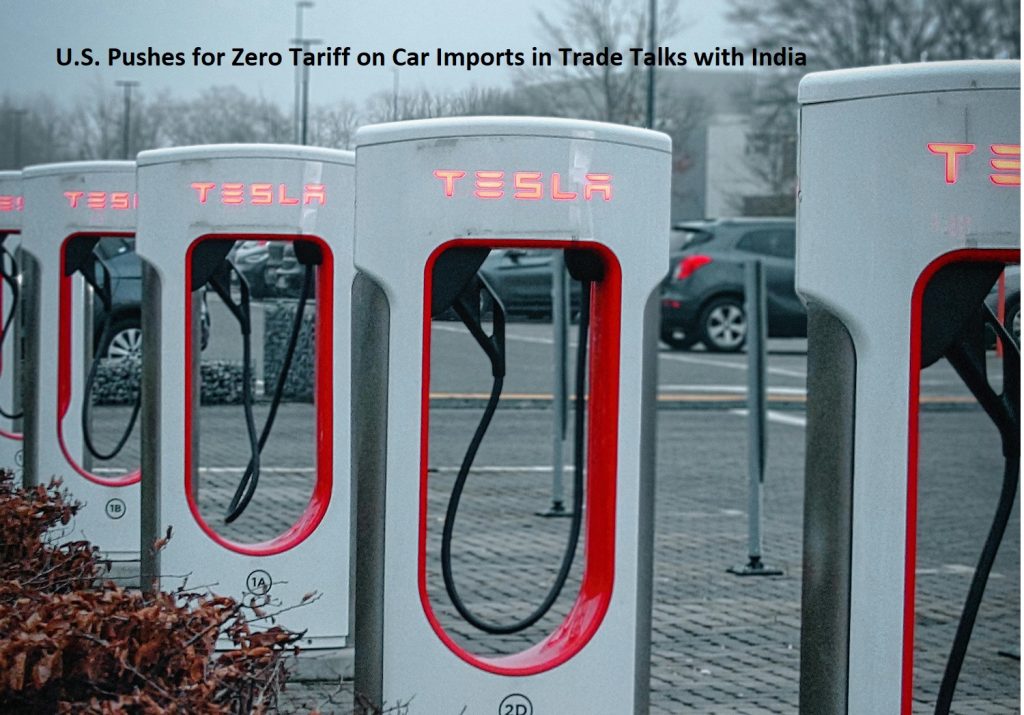How the U.S. trade deal could reshape India’s automobile market and Tesla’s future in the country.
U.S. Pushes for Zero Tariff on Car Imports in Trade Talks with India
The United States is advocating for India to reduce or eliminate tariffs on car imports as part of a proposed trade deal. This move could pave the way for major American car manufacturers, including Tesla, to enter the Indian market more competitively. Currently, India imposes some of the highest import taxes on cars globally, with tariffs reaching up to 110%. The discussions come as both nations seek to deepen economic ties, with a long-term goal of expanding bilateral trade to $500 billion by 2030.
The Current Tariff Structure in India India imposes a high import duty on completely built-up (CBU) vehicles to protect its domestic automotive industry. The structure includes:
- 60% duty on imported cars below $40,000
- 100% duty on imported cars above $40,000
- GST and cess taxes increasing overall costs
This tariff system makes luxury and foreign-manufactured vehicles significantly more expensive in India, limiting consumer choices and discouraging new entrants into the market.
Why the U.S. is Advocating for Tariff Reductions The U.S. sees tariff cuts as a way to promote free trade and allow American automakers to gain a stronger foothold in the rapidly growing Indian automobile sector. Tesla, in particular, has been vocal about India’s restrictive import policies, with CEO Elon Musk repeatedly urging for lower tariffs to facilitate Tesla’s entry into the Indian market.
Key U.S. Motivations:
- Enhancing American Automobile Exports – Lower tariffs would make U.S.-manufactured cars more affordable for Indian consumers.
- Encouraging Investment from Tesla and Other Automakers – Tesla has shown interest in setting up a manufacturing unit in India but has conditioned it on initial tariff reductions.
- Strengthening Trade Relations – As India becomes a key global economy, the U.S. aims to deepen trade engagement across various sectors.
India’s Perspective and Challenges While India is open to negotiations, reducing car import tariffs presents challenges:
- Protecting Domestic Manufacturers: India’s automobile sector is dominated by domestic players like Tata Motors and Maruti Suzuki, and lowering tariffs could threaten their market share.
- Balancing Foreign Direct Investment (FDI) and Local Production: India encourages foreign automakers to establish local manufacturing plants rather than rely on imports.
- Revenue Concerns: Import duties contribute significantly to government revenue, and reducing them might lead to financial shortfalls.
India is likely to negotiate a phased reduction rather than an immediate tariff removal, ensuring a balance between economic growth and domestic industry protection.
Potential Impact of a Zero-Tariff Policy If India agrees to reduce or eliminate tariffs on car imports, several key changes could occur:
- Lower Car Prices – Imported vehicles, including Tesla models, could become more affordable for Indian consumers.
- Increased Competition – Domestic carmakers would face competition from global brands, driving innovation and improved quality.
- Job Creation in the EV Sector – If Tesla establishes a factory in India, it could lead to significant job creation and investment in the electric vehicle (EV) ecosystem.
- Shift Towards Electric Mobility – With Tesla and other U.S. manufacturers entering the market, India’s EV adoption could accelerate.
Examples from Other Countries
- China: Tesla successfully entered the Chinese market after China lowered tariffs and offered incentives for local manufacturing.
- Europe: The EU’s free trade agreements with multiple nations allow for seamless import of automobiles, benefiting consumers with lower prices.
- South Korea: Hyundai and Kia’s global success stems from aggressive free trade agreements that reduced import barriers.
These examples suggest that reduced tariffs can drive investment and economic growth while benefiting consumers.
What’s Next? The trade negotiations between India and the U.S. are expected to focus on tariff reductions across multiple sectors, including automobiles, technology, and agriculture. If India agrees to lower car import tariffs, it could be a game-changing decision for the automobile industry, offering Indian consumers more choices and encouraging greater foreign investment.
While the U.S. push for zero tariffs on cars presents opportunities for American automakers, India must weigh the impact on its domestic industry. A well-balanced approach—possibly through phased tariff reductions and incentives for local manufacturing—could provide mutual benefits for both countries. With trade talks intensifying, the final decision on car import duties will shape the future of India’s automobile market and its relationship with the U.S.
#IndiaTrade #TeslaIndia #USIndiaRelations #EVMarket #AutomobileIndustry #CarImportTariffs


